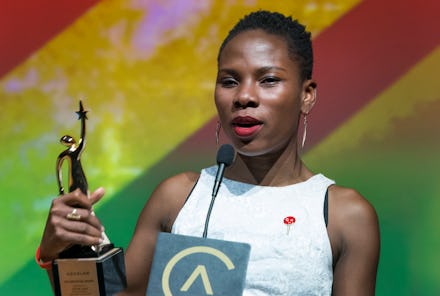The 'Next Web' tech conference is under fire for stiffing professional speakers

The 2017 Next Web conference, a tech event held in Amsterdam in May, features 56 keynote speakers, only 14 of whom are women. That's exactly 25%. But current and former Next Web speakers and invitees say the gender gap is nothing compared to the gender pay gap — a glaring and frequent issue at conferences often dominated by white men.
New York Times best-selling author Luvvie Ajayi is one of several professional speakers who were asked to appear at the Next Web conference without pay. According to Forbes, a representative told Ajayi the company had "no budget to pay any of the speakers and everything they make goes back to production." No travel budget either. "All [the Next Web] can offer is experience, audience and publicity."
Slack engineer Erica Baker was also asked to speak at the conference. When she checked in with her speaker's bureau, she was informed that the Next Web didn't cover speaker's fees.
Yet that wasn't quite true.
Forbes contributor Christina Wallace, a speaker at the Next Web's 2016 conference, noted that while she wasn't paid for speaking, she was in fact compensated for travel. Another author and former tech executive said that after asking "several of the men who have spoken" whether or not they were paid, it was split "50-50."
So why the disparity? To clear things up, Next Web CEO Boris Veldhuijzen van Zanten responded to the Forbes article in an email to Ajayi. He explained that it was false that there was no speaker budget for the conference. There is a pay gap, he admitted, but it's a "logical" one. The Next Web prioritizes whom it pays based on "relevance" and "factors such as knowledge, success, fame and most importantly, demand."
On Twitter, van Zanten added that at the 2016 conference, of the 140 speakers, "about 5 of them got some form of payment (mostly we bought books) and about 20 got tickets." One of whom was Vayner Media founder Gary Vaynerchuk, who told Forbes he was paid in bulk book buying.
Ajayi and van Zanten exchanged tweets, and the conversation spread as people picked apart van Zanten's email and Twitter responses, criticizing the CEO for selective treatment and poor transparency.
Van Zanten countered that he was being "accused of mansplaining." He added, "You just can't ever win that argument."
In an email to Mic, van Zanten was reluctant to elaborate on the record. He said that "the talk about inequality is incredibly important, to me personally and the whole team, but no matter what we say on the matter we will be misquoted and misinterpreted." (Ajayi did not respond to our request for comment.)
Van Zanten went on, doubling down on the "mansplaining" complaint:
"If I go into too much detail, I'm mansplaining. If I keep my answers short, I'm not giving the issue the attention it needs. My takeaway is that more discussion is better, but nothing good will come from saying much more myself. My goal is just to show we mean well by doing rather than talking."
On Twitter, the conversation evolved into the necessity for women and people of color to "prove their worth" in order to achieve equal pay.
The conversation around the Next Web conference makes a few things clear: Having women and people of color onstage is meaningless without paying them equally to their white and male counterparts. Expecting professional women to speak for free while compensating men at the same conference only widens the pay gap and sets a detrimental precedent for other women in the industry. Also, it's questionable whether van Zanten can successfully argue that there isn't a strong enough "demand" for Ajayi to get paid — his company reached out to her to begin with.